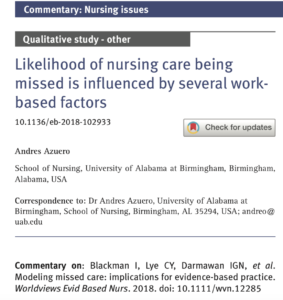Roberta Heale, Associate Editor @robertaheale @EBNursingBMJ
Many variables influence the impact of nurses’ working conditions. Cost containment, nursing shortages and replacement of registered nurses with generic workers are some examples. Strain on nurses because of working conditions has an impact on the care that they provide.
In a recent EBN commentary for an article about missed nursing care both objective data and self-report data demonstrates the influence of nursing work conditions, such as staffing and skill mix, on the likelihood of care being missed.1
I supervised a MScN student in the completion of her thesis in which she explored nursing processes related to unexpected ICU admissions from a ward. Results showed that more patients were admitted to ICU during shifts with higher nurse to patient ratios. In addition, more sets of vital signs were taken and there were more incidents of communication with a physician, or the rapid response team during the shifts with more nurses. We interpreted this to mean that, because they had fewer patients to care for on the shifts with more nurses, they were more likely to spot signs of deterioration and act on them.2
More and more studies are demonstrating that the working environment has an impact on missed nursing care. It makes sense, too. Nurses know which areas are understaffed, where overtime is an expectation and where they receive little support. I remember discussions with my colleagues where they expressed their concern about missing important changes in patient health status. The result is that nurses leave. In my previous workplace, nurses would find better work environments and they were most often replaced with inexperienced nurses who were at most risk of missing even more care.
The solutions are complex. However, one straightforward move is for organizations to take into consideration the individual characteristics of specific working environments and ensure that there are enough nurses on each shift. There also needs to be effective support for nurses. This can take many forms ranging from mentorship programs to policies and regulation that promotes adequate nurse staffing ratios. Resources should also be allotted to professional development for nurses. Finally, nurses have to continue to speak out and advocate for reasonable working conditions to mitigate missed nursing care.
- Andres Azuero. (2018). Likelihood of nursing care being missed is influenced by several work-based factors https://ebn.bmj.com/content/21/3/68. Commentary on:Blackman I, Lye CY, Darmawan IGN, et al. Modeling missed care: implications for evidence-based practice. Worldviews Evid Based Nurs. 2018. doi: 10.1111/wvn.12285. https://ebn.bmj.com/content/ebnurs/21/3/68.full.pdf
- Martin, J., Heale, R., Lightfoot, N. & Hill, L. (in press). Nursing processes related to unexpected ICU admissions. Diversity of Research in Health Journal.